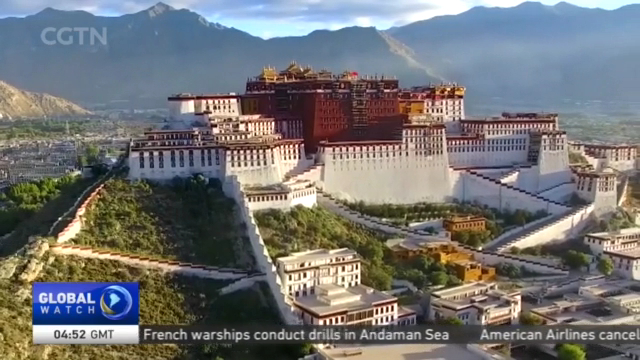
13:27, 10-Jun-2019
Tibet: A Journey Through Time: Radical changes seen in 60 years since reform
Updated
18:20, 11-Jun-2019
02:22

Six decades ago, China's Tibet Autonomous Region, which sits on the world's highest plateau, was an area of misery and extreme poverty. It was under serfdom until 1959 when it went through peaceful liberation. Since then, Tibet has seen incredible changes. And people there have been assured of an even brighter future. CGTN's Sun Ye has more.
High up in Tibet, the scenery has stayed breathtaking and unchanged for hundreds of years. But life on the plateau today is vastly different from what it was sixty years ago.
Before 1959, it was unbearably harsh, fewer than 100 people in the region had access to electricity. Only 5 percent of the entire population there could read.
But six decades since Democratic Reform, the freed up serfs and their proud next generation are in a new world where their life expectancy has almost doubled, and their per capita disposable income is now 40 times higher than it was in 1959.
A cause for celebration, as Tibetans did this March.
WU YINGJIE, PARTY SECRETARY TIBET AUTONOMOUS REGION "People's incomes have steadily increased, with their lives getting better. What they pursue now are not just simple living supplies. Stuff like cars, laptops, high-definition TVs and smart phones are not rarities. More than 80 percent of impoverished Tibetans have gotten out of poverty."
And life is better, not just because of fattening wallets.
SUN YE BEIJING "China released a white-paper marking sixty years of Tibet's Democratic Reform earlier this year. From education health care, social insurance to religious freedom, the white-paper says Tibet is making leaps for the better in every way, as its people have asked for."
NORBU DONDRUP, EXECUTIVE VICE CHAIRMAN TIBETAN AUTONOMOUS REGIONAL PEOPLE'S GOVERNMENT "Human rights are essentially the rights for survival and development. Tibet has achieved history-making strides compared to the old days."
And officials say efforts to advance will continue, as Tibet continues to change. SY, CGTN, BJ.

SITEMAP
Copyright © 2018 CGTN. Beijing ICP prepared NO.16065310-3
Copyright © 2018 CGTN. Beijing ICP prepared NO.16065310-3